|
|
|
Sort Order |
|
|
|
Items / Page
|
|
|
|
|
|
|
| Srl | Item |
| 1 |
ID:
096718


|
|
|
|
|
| Publication |
2010.
|
| Summary/Abstract |
The quality and the power of human activities affect the external environment in different ways that can be measured and evaluated by means of several approaches and indicators. While the scientific community has been publishing several proposals for sustainable development indicators, there is still no consensus regarding the best approach to the use of these indicators and their reliability to measure sustainability. It is important, therefore, to question the effectiveness of sustainable development indicators in an effort to continue in the search for sustainability. This paper compares the results obtained with emergy accounting with five global Sustainability Metrics (SMs) proposed in the literature to verify if metrics are communicating coherent and similar information to guide decision makers towards sustainable development. Results obtained using emergy indices are discussed with the aid of emergy ternary diagrams. Metrics are confronted with emergy results, and the degree of variability among them is analyzed using a correlation matrix created for the Mercosur nations. The contrast of results clearly shows that metrics arrive at different interpretations about the sustainability of the nations studied, but also that some metrics may be grouped and used more prudently. Mercosur is presented as a case study to highlight and explain the discrepancies and similarities among Sustainability Metrics, and to expose the extent of emergy accounting.
|
|
|
|
|
|
|
|
|
|
|
|
|
|
|
|
| 2 |
ID:
097511


|
|
|
|
|
| Publication |
2010.
|
| Summary/Abstract |
The quality and the power of human activities affect the external environment in different ways that can be measured and evaluated by means of several approaches and indicators. While the scientific community has been publishing several proposals for sustainable development indicators, there is still no consensus regarding the best approach to the use of these indicators and their reliability to measure sustainability. It is important, therefore, to question the effectiveness of sustainable development indicators in an effort to continue in the search for sustainability. This paper compares the results obtained with emergy accounting with five global Sustainability Metrics (SMs) proposed in the literature to verify if metrics are communicating coherent and similar information to guide decision makers towards sustainable development. Results obtained using emergy indices are discussed with the aid of emergy ternary diagrams. Metrics are confronted with emergy results, and the degree of variability among them is analyzed using a correlation matrix created for the Mercosur nations. The contrast of results clearly shows that metrics arrive at different interpretations about the sustainability of the nations studied, but also that some metrics may be grouped and used more prudently. Mercosur is presented as a case study to highlight and explain the discrepancies and similarities among Sustainability Metrics, and to expose the extent of emergy accounting.
|
|
|
|
|
|
|
|
|
|
|
|
|
|
|
|
| 3 |
ID:
087454
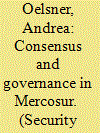

|
|
|
|
|
| Publication |
2009.
|
| Summary/Abstract |
This article constitutes a first exploration of the security governance of Mercosur, the common market of Latin America's Southern Cone. Drawing on securitization theory, the article argues that three major clusters of security issues have consecutively become the focus of the region's security agenda. First, prior to Mercosur's foundation and during the various processes of democratization in the region, the success of democratic transitions, the stabilization of civil-military relations and the region's insertion into the world economy were successfully securitized. At a second stage, more traditional issues associated with the use of military force gained centrality in the security agenda. Finally, and particularly since 11 September 2001, the region's security architecture was redesigned to accommodate `new' security threats. Around the consensuses on these three issue-clusters, formal and informal structures of policy coordination have emerged, constituting a limited system of governance. Yet, though regional governance is admittedly weak, this article contends that the security consensuses and the emerging institutional structures that have ensued are contributing to forging a shared normativity in the Mercosur area.
|
|
|
|
|
|
|
|
|
|
|
|
|
|
|
|
| 4 |
ID:
076958
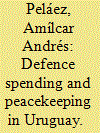

|
|
|
|
|
| Publication |
2007.
|
| Summary/Abstract |
Uruguay is a country with a very unusual profile, since it has just 3.4 million inhabitants but is among the top ten troop contributors to the UN PKO (Peace Keeping Operations) and is the first contributor per capita. In 2002 and 2003 it was the seventh troop contributor to the UN, and by the end of 2005 it was eighth in the UN ranking. Uruguay has never had any imminent external threat to its security after its independence in 1828, and it has had no internal threat since the end of the urban guerrillas' actions in the 1970s. The country has no defence industry, and has always had an all-volunteer military service, which presently involves almost 1% of the total population, and about 2% of the labour force. The empirical evidence presented in this paper shows that, in the past decades, Uruguayan defence spending has been influenced mainly by internal factors, most of them of an economic nature. The high participation in PKO has not increased military expenditure and it has produced a positive impact on the country's economy
|
|
|
|
|
|
|
|
|
|
|
|
|
|
|
|
| 5 |
ID:
099892
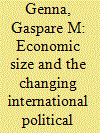

|
|
|
|
|
| Publication |
2010.
|
| Summary/Abstract |
Why are some free trade agreements (FTAs) in the western hemisphere successfully negotiated and implemented while others seem to stagnate during negotiations? FTAs are more likely to develop when there is an asymmetrical power relationship and potential partners are satisfied with projected trade patterns. The European Union (EU) and United States have been successful in negotiating agreements with the Caribbean and Central American (CCA) countries. However, current bilateral and multilateral trade talks between the EU, the Common Market of the South (MERCOSUR), and United States are at a standstill. Although all four sets of trade negotiations include dissatisfactory conditions for the Latin American countries, the two negotiations with the CCA countries were successful completed, but the two involving MERCOSUR countries have not. These results are partially due to two factors: the economic size differential between the CCA countries and MERCOSUR vis-à-vis the EU and United States, and MERCOSUR's growing economic ties with China. MERCOSUR's medium-size economy and ties with China allows it to forgo FTAs with the EU and United States until more favorable conditions are met. However the CCA countries' immensely smaller size and economic ties with China do not allow for such abstention.
|
|
|
|
|
|
|
|
|
|
|
|
|
|
|
|
| 6 |
ID:
085713
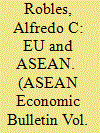

|
|
|
|
|
| Summary/Abstract |
In May 2007, the EU and ASEAN agreed to launch negotiations for an FTA. In entering the negotiation process, it is obvious that the EU has learned lessons from its failed negotiations with Mercosur. Thus the EU sought to ensure that there was a consensual basis for the (positive) assessment of an FTA's consequences, and it insisted on setting a deadline for the negotiations. ASEAN has to learn two lessons from the EU-Mercosur experience. First, there is a difference between the EU's rhetoric and the reality of the negotiations. Second, there is a wide gap between the possible negative consequences of FTA and the assistance that the EU may offer to enable countries, firms and workers to cope with these consequences.
|
|
|
|
|
|
|
|
|
|
|
|
|
|
|
|
| 7 |
ID:
101840


|
|
|
|
|
| Publication |
2011.
|
| Summary/Abstract |
The role of international friendship in regional integration - be it as one of encouraging integration or as its by-product - tends to be overshadowed by (realist) assumptions of naked self-interest. This article aims to open up a space for friendship in the study of regional integration, by exploring the structuration of a series of speech acts and institutional facts that can be interpreted as signs of engagement in, and proofs of, friendship. In doing this, it puts forward a new analytical perspective and methodological framework. The case studies chosen to illustrate the analysis - the Franco-German and the Argentine-Brazilian dyads - reflect the historical meaning of the experience of moving away from enmity/antagonism towards building relationships based on mutual trust, which put these dyads at the centre of regional integration processes.
|
|
|
|
|
|
|
|
|
|
|
|
|
|
|
|
| 8 |
ID:
077429


|
|
|
|
|
| Publication |
2007.
|
| Summary/Abstract |
The European Union (EU) and the Common Market of the South (Mercosur) are very different regions that have come to seemingly analogous compromises as far as the operation of their common markets is concerned. Like the EU, Mercosur seems to confirm the textbook logic of integration development from a free trade area to a customs union and then to a common market. Does this mean that well-developed theories of European integration that emphasize certain properties of the European region are useless in explaining and predicting the Mercosur process? This article proposes a framework for comparison of the two blocs that uses selected theories of European integration: neofunctionalism, liberal inter-governmentalism, social constructivism and neo-realism. The framework is applied to the examination of intra-regional cohesion of the two interstate cooperative groups. Comparison of the two unions demonstrates that, despite similar institutional structures and partial set-ups of the common markets, they are qualitatively different processes that are highly conditioned by their unique regional properties. There is therefore no contradiction between Mercosur and the predictions of the Mercosur integration based on the theories of European integration. At the same time, Mercosur is strongly affected by the passive and active influence of the EU. However, the one-size-fits-all prescriptions for regionalism in the global south should be critically reevaluated. Mercosur and other regions have to optimize their development looking for solutions to specific regional problems rather than trying to adapt textbook models of integration derived from integration experience of the EU or NAFTA. The study emphasizes the importance of non-economic factors of integration and the necessity to evaluate the success of integration associations outside Europe in the context of local social realities rather than against the EU criteria
|
|
|
|
|
|
|
|
|
|
|
|
|
|
|
|
| 9 |
ID:
086412
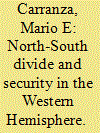

|
|
|
|
|
| Publication |
2009.
|
| Summary/Abstract |
This paper examines the economics-security nexus in US policy toward South America, and the implications for South America of the 'securitization' of US foreign economic policy during the Bush administration. There has always been a tight linkage between the US foreign economic and security agendas but the real issue is the degree of 'tightness' at a given point in time. After the Alliance for Progress lost its way the United States tended to pursue its economic and security interests in South America in separate tracks, even if preventing Soviet intrusions in the region remained in the background. Yet after the collapse of the Free Trade Area of the Americas (FTAA) negotiations in 2004 a US strategy of 'divide and conquer' through bilateral trade deals has been accompanied by a 'securitization' discourse and there are some indications that it may 'securitize' as a new threat the social movements and neopopulist regimes that oppose neoliberal economic policies. The paper discusses the limits of the securitization thesis. The conclusion examines the future of US-South American relations and argues that the United States needs to renew its commitment to genuine multilateralism and re-engage the region to establish an effective and lasting partnership for dealing with common economic and security challenges in the twenty-first century.
|
|
|
|
|
|
|
|
|
|
|
|
|
|
|
|
| 10 |
ID:
174550
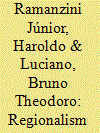

|
|
|
|
|
| Summary/Abstract |
The aim of this article is to analyse the performance of regionalism in the Global South through a comparative analysis of Mercosur and Ecowas with regard to the trade and democracy protection agendas, by contrasting their institutional design and regional leadership concerning the two issues. Firstly, it analyses the evolution of intra-regional trade as well as the trade agenda of each bloc concerning international negotiations with other states or economic blocs. Secondly, it discusses the relevance of democratic stability in the two regional organisations and how each organisation has performed in cases of democratic rupture in member states. When comparing the dynamics of the two organisations, we argue that differences in terms of institutional design and regional leadership have meant that Ecowas has been less ambitious than Mercosur in its trade agenda, but more decisive vis-à-vis the region’s democratic stability. Thus, this article aims to contribute to the comparative regionalism literature, setting out an analytical comparative framework for assessing the performance of regional organisations, which remains a difficult task for this particular research agenda.
|
|
|
|
|
|
|
|
|
|
|
|
|
|
|
|
| 11 |
ID:
146299
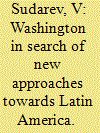

|
|
|
|
|
| Summary/Abstract |
THE ACTIONS of Barack Obama's administration in Latin America in some respects differ from what his predecessors were doing there. These differences emerged during his election campaign. It should be admitted that he has inherited an extremely beneficial legacy from George W. Bush, who, during his two presidential terms, failed to achieve his main goal in the region, i.e., to create the Free Trade Area of the Americas (FTAA), largely due to the leftist drift that emerged there in the early 21st century.
|
|
|
|
|
|
|
|
|
|
|
|
|
|
|
|
|
|
|
|
|